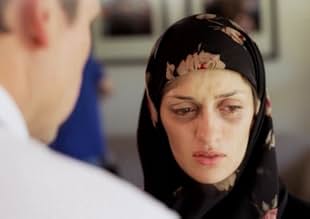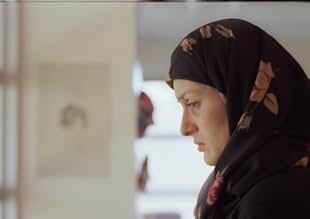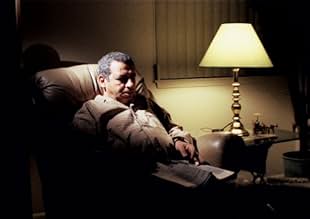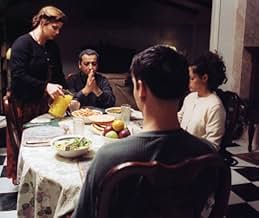Ajouter une intrigue dans votre langueBeyond Honor is a heart-stopping, emotionally resonant portrayal of gender roles and the dynamics of power in a claustrophobic immigrant family living in Southern California.Beyond Honor is a heart-stopping, emotionally resonant portrayal of gender roles and the dynamics of power in a claustrophobic immigrant family living in Southern California.Beyond Honor is a heart-stopping, emotionally resonant portrayal of gender roles and the dynamics of power in a claustrophobic immigrant family living in Southern California.
Mirelly Taylor
- Sahira Abdel-Karim
- (as Ruth Osuna)
Jason Smith
- Brian
- (as Jason David Smith)
Carl Darchuk
- Dr. Woods
- (as Carl Darchuck)
Lauren Boyle
- Medical Student Actor
- (as Lauren Johnson)
Ina Barrón
- Gennifer
- (as Ina Barron)
Michelle Gunn
- Dancer
- (as Michelle Martin)
Histoire
Le saviez-vous
- AnecdotesToutes les informations contiennent des divulgâcheurs
Commentaire en vedette
"Beyond Honor" takes extremely important and serious issues of the treatment of women and didactically reduces them to the stereotyped treatment of an R-rated after-school special.
From the heavy-handed symbolic opening scene of an innocent little girl observing the ritual slaughter of a goat, debut writer/director Varun Khanna draws all his immigrant characters in the most simplistic outlines.
While the central character of the striving medical student "Sahira" is dynamically brought to life by Mirelly Taylor, the rest of the acting seems to be done by stick figures. Wadie Andrawis's father loses any point of demonstrating specific issues of possible suppression of women in Arab immigrant communities to seeming to be at the very least a universal domestic abuser of his wife and children to seeming to be violently mentally deranged. Even the traditionally religious men in border-line agit prop Middle Eastern films as "The Circle (Dayereh)", "Kadosh" and "Osama" weren't presented so cartoonishly evil. By the end of the film the dialog pretty much consists of shouted obscenities.
Though the same day I happened to see this film in a theater, "E.R." broadcast a very similar story line with a similarly obsessed revengefully religious brother driven partly by post-9/11 pressures and a blond boyfriend, that doesn't make this character any more human here, as he was equally poorly written, with an added twist of repressed sexuality spilling out into in ever more abusive ways.
The traditional women are presented en masse with as eyes-only visible through their chadors or burkhas, or whatever they are called, though my understanding is that they wouldn't wear those indoors among family members.
The climatically violent scene is presented like a slo-mo "Perils of Pauline" silent film confrontation.
Though this film does a poor job of representing such a serious issue, it does tack on the end of the film facts and links about female genital mutilation. Over the past few years there have been many excellent films about the Middle-Eastern/South Asian-immigrant experience in the U.S., including issues for women. A much more effective and dramatic treatment about honor killings was a short I saw at the Tribeca Film Festival "In The Morning", directed by Danielle Lurie, which is evidently being used by non-profit organizations who are more effectively fighting such horrors than these unfortunately cardboard caricatures accomplish.
(My original version of this review, posted 24 March 2006, offended someone. This has been revised 29 March 2008)
From the heavy-handed symbolic opening scene of an innocent little girl observing the ritual slaughter of a goat, debut writer/director Varun Khanna draws all his immigrant characters in the most simplistic outlines.
While the central character of the striving medical student "Sahira" is dynamically brought to life by Mirelly Taylor, the rest of the acting seems to be done by stick figures. Wadie Andrawis's father loses any point of demonstrating specific issues of possible suppression of women in Arab immigrant communities to seeming to be at the very least a universal domestic abuser of his wife and children to seeming to be violently mentally deranged. Even the traditionally religious men in border-line agit prop Middle Eastern films as "The Circle (Dayereh)", "Kadosh" and "Osama" weren't presented so cartoonishly evil. By the end of the film the dialog pretty much consists of shouted obscenities.
Though the same day I happened to see this film in a theater, "E.R." broadcast a very similar story line with a similarly obsessed revengefully religious brother driven partly by post-9/11 pressures and a blond boyfriend, that doesn't make this character any more human here, as he was equally poorly written, with an added twist of repressed sexuality spilling out into in ever more abusive ways.
The traditional women are presented en masse with as eyes-only visible through their chadors or burkhas, or whatever they are called, though my understanding is that they wouldn't wear those indoors among family members.
The climatically violent scene is presented like a slo-mo "Perils of Pauline" silent film confrontation.
Though this film does a poor job of representing such a serious issue, it does tack on the end of the film facts and links about female genital mutilation. Over the past few years there have been many excellent films about the Middle-Eastern/South Asian-immigrant experience in the U.S., including issues for women. A much more effective and dramatic treatment about honor killings was a short I saw at the Tribeca Film Festival "In The Morning", directed by Danielle Lurie, which is evidently being used by non-profit organizations who are more effectively fighting such horrors than these unfortunately cardboard caricatures accomplish.
(My original version of this review, posted 24 March 2006, offended someone. This has been revised 29 March 2008)
- noralee
- 28 mars 2008
- Lien permanent
Meilleurs choix
Connectez-vous pour évaluer et surveiller les recommandations personnalisées
Détails
Box-office
- Brut – États-Unis et Canada
- 6 437 $ US
- Fin de semaine d'ouverture – États-Unis et Canada
- 1 114 $ US
- 19 mars 2006
- Brut – à l'échelle mondiale
- 6 437 $ US
- Durée1 heure 41 minutes
- Couleur
Contribuer à cette page
Suggérer une modification ou ajouter du contenu manquant

Lacune principale
By what name was Beyond Honor (2004) officially released in Canada in English?
Répondre













